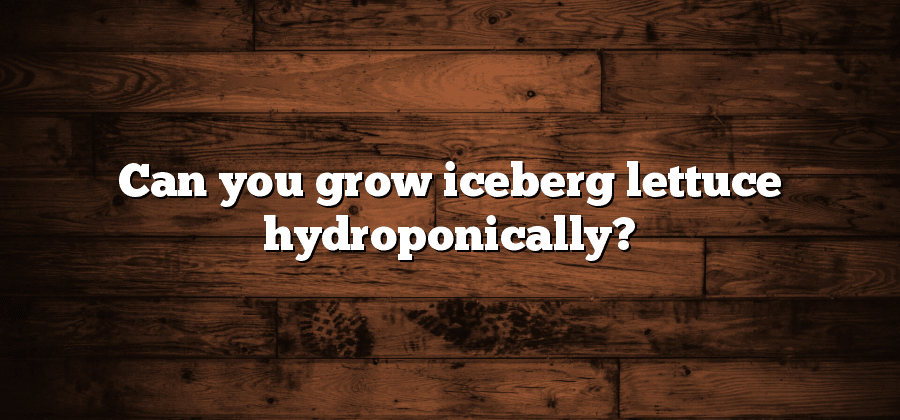Suitable Hydroponic Systems
There are several suitable hydroponic systems available for growing plants without soil. Each system has its own advantages and considerations, so choosing the right one depends on various factors such as space availability, budget, and the specific needs of the plants being grown.
One popular hydroponic system is the Deep Water Culture (DWC) system. In this system, plants are suspended in a nutrient-rich solution, with their roots submerged in water. An air pump provides a constant supply of oxygen to the roots, promoting healthy growth. This system is relatively simple and cost-effective, making it a popular choice for beginners. However, it requires regular monitoring of nutrient levels and pH balance to ensure optimal plant nutrition.
Another option is the Nutrient Film Technique (NFT) system, where a thin film of nutrient solution flows over the roots of the plants, continuously supplying them with nutrients. This system is especially suitable for growing small, leafy plants such as lettuce or herbs. It requires less water compared to other systems and allows for easy maneuverability and harvesting. However, it requires frequent monitoring of the nutrient solution flow and careful maintenance to prevent root blockages.
Recommended Nutrient Solutions
Nutrient solutions play a crucial role in the success of a hydroponic system. These solutions provide essential minerals and vitamins to the plants, ensuring their healthy growth and development. When choosing a nutrient solution, it is important to consider the specific needs of the plants being cultivated. Different plants require different ratios and concentrations of nutrients to thrive. Therefore, it is recommended to use a nutrient solution specifically formulated for hydroponics, as it contains the correct balance of macronutrients and micronutrients necessary for optimal plant growth.
One popular type of nutrient solution is a complete, balanced formula that provides all the necessary nutrients in a single solution. This type of solution simplifies the feeding process and eliminates the need for multiple bottles of individual nutrients. Some complete nutrient solutions also come in different formulations for different stages of plant growth, such as a vegetative formula for leafy growth and a flowering formula for the reproductive stage. These specialized formulas ensure that plants get the right nutrients at the right time, promoting vigorous growth and high yields.
Optimal Temperature and Lighting
Paragraph 1:
Maintaining the optimal temperature and lighting conditions is crucial for successful hydroponic cultivation. Temperature plays a significant role in the growth and development of plants, as it directly affects their metabolic processes. Most commonly, the ideal temperature range for indoor hydroponic systems lies between 18 to 24 degrees Celsius (64 to 75 degrees Fahrenheit). Deviating from this range can lead to stunted growth, wilting, or even death of the plants. It is essential to provide a stable and controlled environment by using adequate insulation, ventilation, and cooling systems to avoid temperature fluctuations.
Paragraph 2:
In addition to temperature, lighting is another critical factor in hydroponic systems. Unlike traditional outdoor gardening, where plants rely on sunlight, indoor hydroponic setups require artificial lighting to provide the necessary energy for photosynthesis. The most suitable type of lighting for hydroponics is LED grow lights, as they can offer a full spectrum of light that closely mimics natural sunlight. LED lights are energy-efficient, durable, and emit less heat, making them a preferred choice amongst growers. Adequate light intensity is also crucial for plant health, and it can be adjusted by varying the distance between the light source and the plants or by using light reflectors to distribute the light more efficiently.
Importance of pH Levels
One crucial aspect of hydroponic gardening that must not be overlooked is the maintenance of optimal pH levels. The pH balance, which measures the acidity or alkalinity of a solution, plays a significant role in plant health and nutrient absorption. Maintaining the correct pH range is essential for the plants to thrive and reach their full potential.
The appropriate pH level varies depending on the type of plant being grown, but in general, a pH range of 5.5 to 6.5 is considered ideal for most hydroponic systems. Deviations from this range can lead to nutrient deficiencies or toxicities, resulting in stunted growth or even plant death. Regular monitoring of the pH levels in the nutrient solution and adjustments when necessary are crucial to ensure the plants receive the right balance of nutrients and achieve optimum growth.
Seed Selection and Germination
Paragraph 1:
To achieve successful hydroponic gardening, careful consideration must be given to seed selection and germination. With a plethora of options available, it is crucial to choose seeds that are specifically bred or suited for hydroponic systems. Selecting the right seeds ensures higher chances of successful germination and optimal growth. The key is to look for seeds that have a shorter germination period, are disease-resistant, and have been tested and proven to thrive in a soilless environment. This careful selection process will lay the foundation for a robust hydroponic garden that bears healthy and productive plants.
Paragraph 2:
Germination is a critical stage in the life cycle of a plant, and it is even more crucial in hydroponics where the plants solely rely on the nutrient solution for their growth. Proper seed germination sets the stage for healthy root development, which in turn supports the growth and productivity of the plants throughout their life cycle. Maintaining the ideal environmental conditions during the germination process is essential. This includes providing the right amount of moisture, temperature, and light to ensure prompt and successful seedling emergence. By paying attention to every detail during seed selection and germination, hydroponic gardeners can lay a solid foundation for a thriving garden with bountiful harvests.






